Published 2024-12-20
Keywords
- Liminality Theory,
- Vazha-Pshavela,
- “The Snake-Eater”
Abstract
Concept of liminality is associated with the changes in life of various types. According to anthropologic theory of liminality, any variability implies three phases. 1. Separation; 2. Liminality; 3. Incorporation.
According to the liminality theory, in interpretation of the literary text, naturally, following of the characters’ transformation process is of particular interest. Our attention was focused on the way of comprehension of the characters with certain common signs, in this case – Vazha-Pshavela. In his poems “Host and Guest” and “Aluda Ketelauri” the process of the characters’ internal transformation correspond to the stages distinguished within the liminality anthropological theory. In our view, the situation is different, to some extent, in case of Mindia, the main character of “The Snake-Eater". His transformation process does not fully correspond to the stages identified according to anthropological theory of liminality.

